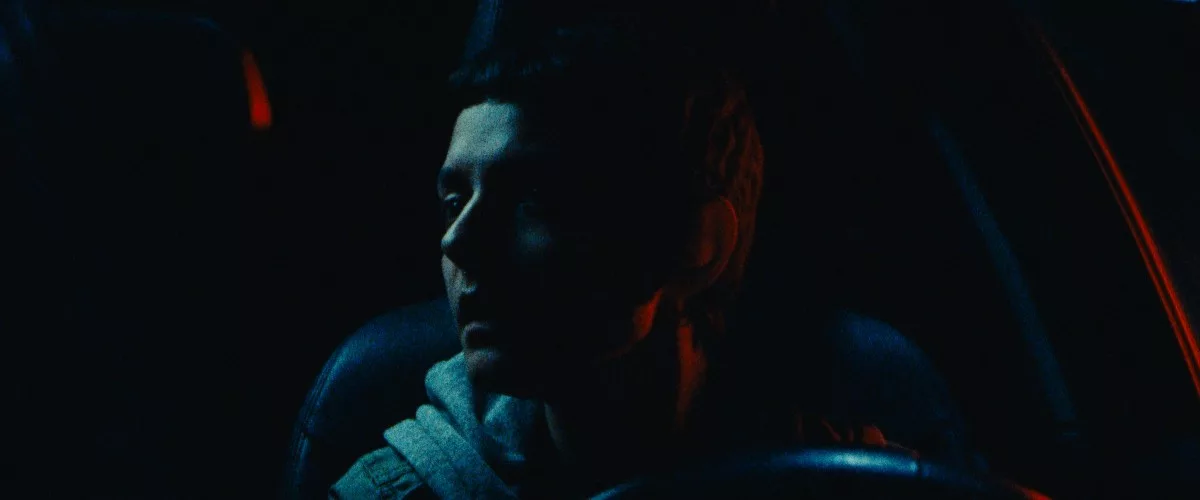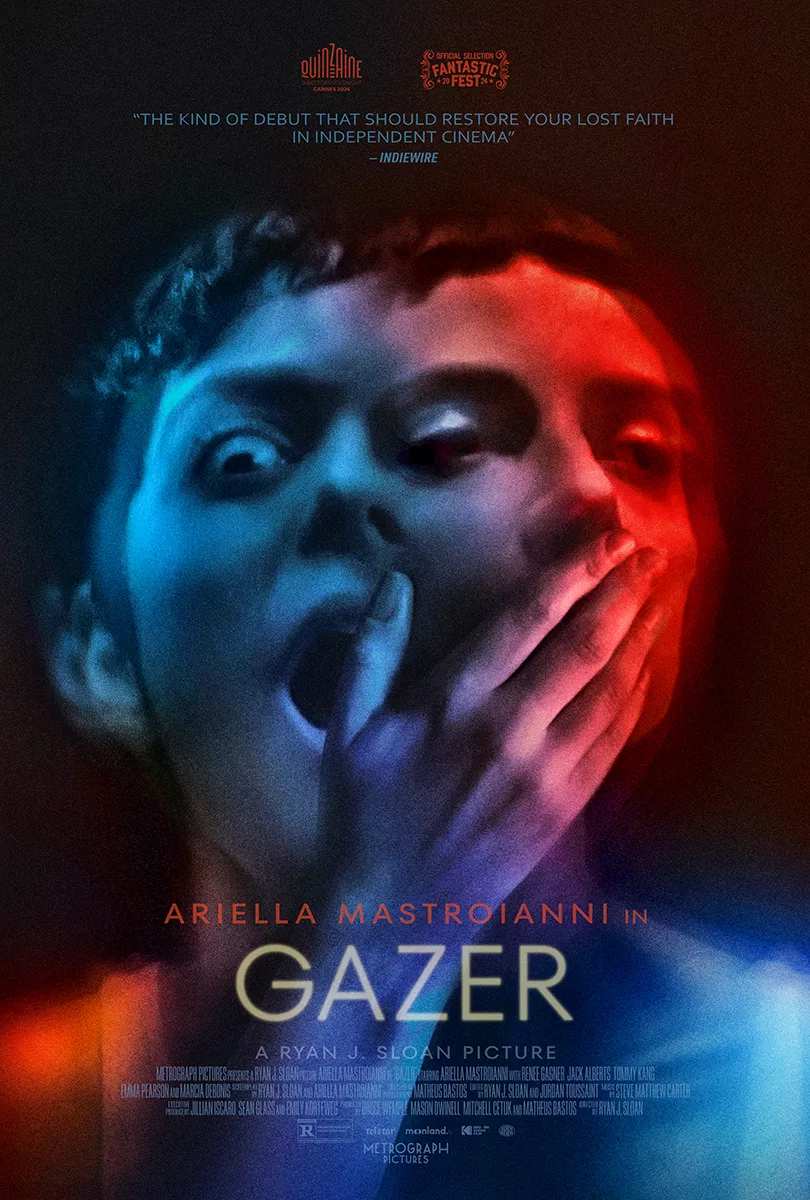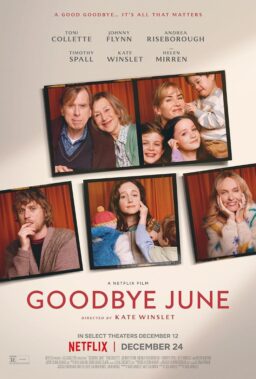Frankie Rhodes (Ariella Mastroianni) is a woman in trouble from the very start of “Gazer.” Suffering from a rare neurological condition called dyschronometria, which makes it hard for her to keep track of time, she’s first glimpsed listening to a voice on a cassette tape—her own, we learn—that instructs her to focus on what she sees in front of her, so as to maintain the grip on reality that starts to slip whenever her concentration falters.
Often, this equates to spying on strangers, but voyeurism is far from a miracle cure, particularly for someone like Frankie, who is in dire economic straits. One night, she loses her job at a gas station after observing what appears to be a violent altercation through the window of an apartment building across the street—and failing to notice an increasingly irate customer who’s been waiting for her to fill up his tank.
If only Frankie could consider this an isolated incident rather than a sign of that progressive deterioration the doctors warned her about. But the absence in Frankie’s mind is more than absent-minded. As she fades away—first for minutes, then hours, and sometimes days—it’s a kind of self-betrayal. “If you feel yourself zoning out, rewind tape,” the ghost of some past Frankie reminds her, wafting in through a pair of black headphones from the beaten-up Walkman she keeps closer, even, than any of the loved ones who’ve stuck around through what has been a difficult, painful decline for all involved. No matter what methods she’s devised to stay in the moment, Frankie’s running out of time; when it comes to her young daughter (Emma Pearson), living with her mother-in-law (Marianne Goodell), there’s no way to rewind or to recover what’s lost. And that she can’t quite recall the night her husband (Grant Schumacher) took his own life is yet another unending source of anguish.
Set largely at night, in a grimy, industrial tract of New Jersey where the emptied-out streets—as shot in grainy 16mm, by the talented cinematographer Matheus Bastos—have turned eerie and somnambulant, “Gazer” is mainly about this sad, doomed character’s attempts to solve a mystery, one in which her own unreliable memory is directly implicated. Whatever Frankie thinks she saw across from the gas station, be it an incident of domestic abuse or something more unusual, the woman she watched (Renee Gagner) soon approaches her at a grief support group for suicide-loss survivors to reveal she saw Frankie, too. Having fled her apartment that same night to escape her controlling brother (Jack Alberts), the woman plans to skip town, she explains — but she needs Frankie’s help to make a clean getaway. One enigmatic exchange leads to another, then another.
Before long, the woman does disappear, but not quite as Frankie expected. Police arrive on the scene, and evidence stacks up that something truly awful has befallen her. In a haze of increasingly intermittent blackout periods, Frankie’s left to question not only what’s taken place but what she might not remember about her involvement. Round and round, like a circle in a spiral, “Gazer” assumes the narrative form of a film noir, in which the forces conspiring to trap Frankie—the shadows crushing her from all sides—exist primarily, but not exclusively, in her mind’s twisting corridors. (Steven Matthew Carter’s terrific noir score, thick with squelching saxophones, is itself as treacherous and immersive as the story it accompanies, unraveling alongside its protagonist into abraded electronic textures.)
As Frankie sleuths her way through a desolate stretch of motels, factories, and wetlands, even as her sense of reality threatens to collapse in on itself, the film’s structure recalls the mind games of “Following” and “Memento,” two early films by Christopher Nolan that surely informed the real backstory of this film’s production as well. Entirely self-financed by Mastroianni and director Ryan J. Sloan, both of whom co-wrote the script, “Gazer” was shot on weekends for two-and-a-half years, in April and November, when they had time and money to spare. Nolan, also shooting on 16mm stock, made “Following” in similarly piecemeal fashion across a year; Sloan and Mastroianni (at least in their debut feature) clearly share his fascination with intricate, nonlinear narratives that first give the audience time to hold up and inspect all the jigsaw-shaped plot pieces before snapping them into place.
What emerges from this approach in “Gazer,” though, is a fractured, sensory puzzle of memory and fear more than a cohesive big picture. That speaks to a certain integrity on the part of its filmmakers, whose efforts to inhabit this unreliable narrator’s headspace ultimately plunge the audience into the same type of darkness that she descends through. Suspicions she can’t prove, intertwined with anxieties she can’t shake and black holes she can’t fill, leave Frankie adrift. Inevitably, the film’s view of voyeurism sides with conspiracy cinema like “Blow-Up” and “The Conversation” over “Rear Window” — the more she sees, the less she knows, and she senses rather than sees the danger she’s most certainly in. The film’s horror is gradual and oneiric, like an actual nightmare in that Frankie’s dread is matched by her curiosity, and the fragility of her psyche brings forth subconscious bravery as well.
There’s also a profound loneliness to “Gazer,” found not only in this perceptual degeneration but in the dull ache of a world vanishing right alongside Frankie. Shaping their film in the destabilizing isolation of COVID, Mastroianni and Sloan conjure from their native New Jersey an evanescent realm, all empty husks and outskirts, where people are slowly swallowed up and buildings linger like phantom limbs, no longer quite there but still full of feeling. They make that place palpable with a vision that feels at once ingenious and highly genuine.
“Gazer” opens April 4 via Metrograph Pictures.
















